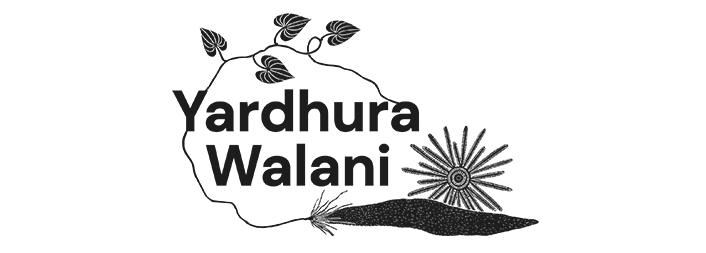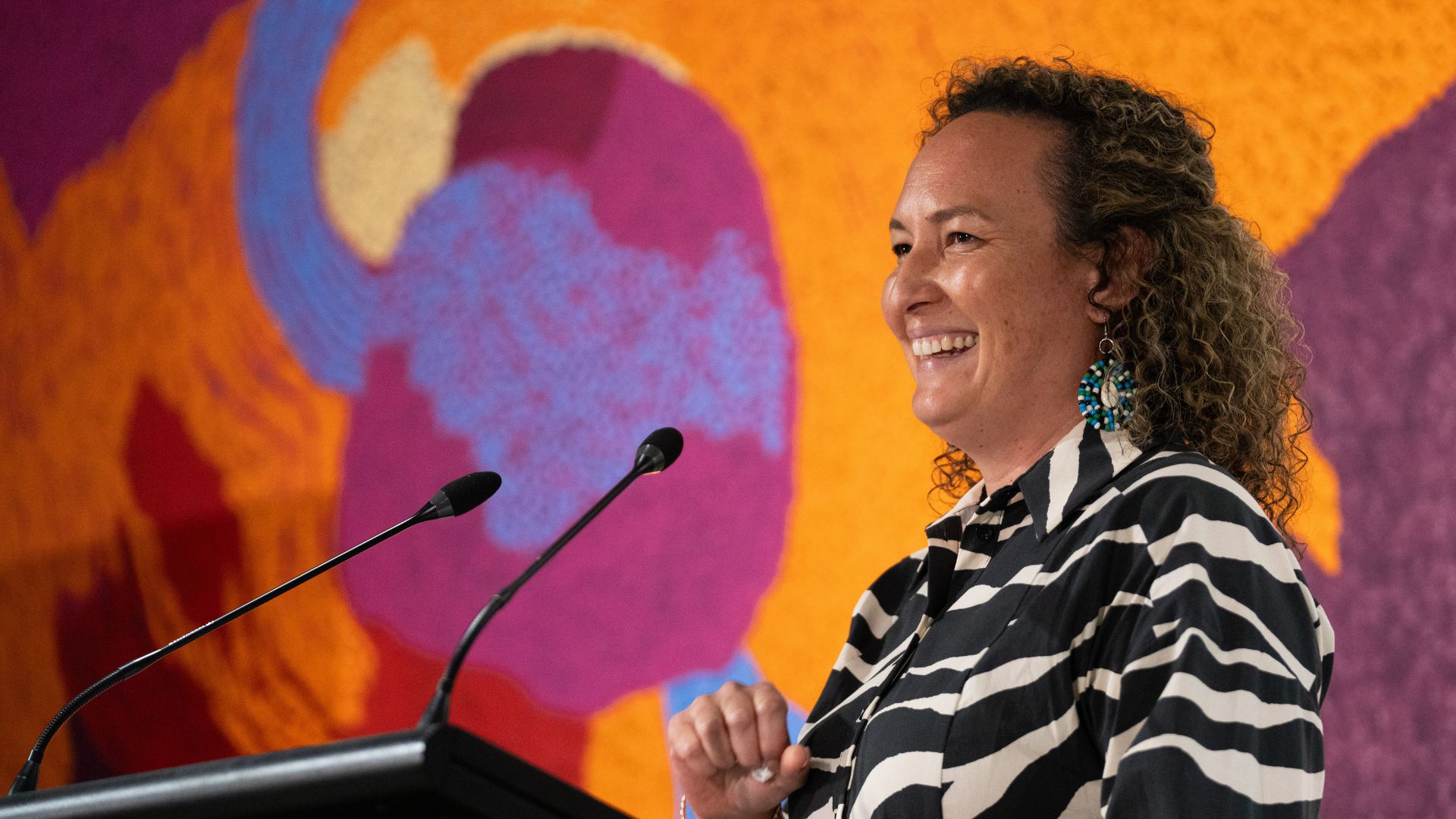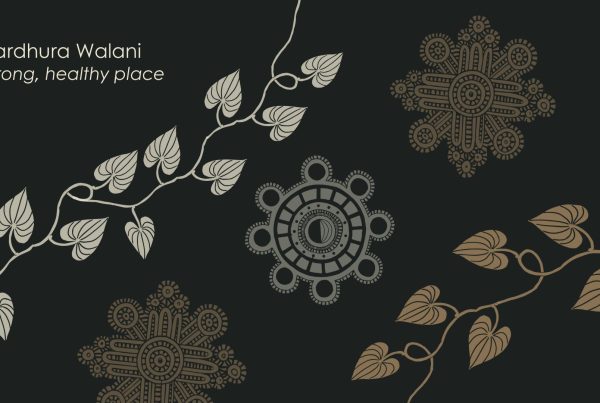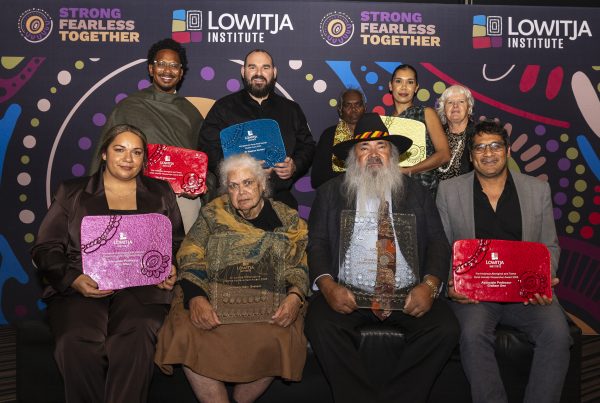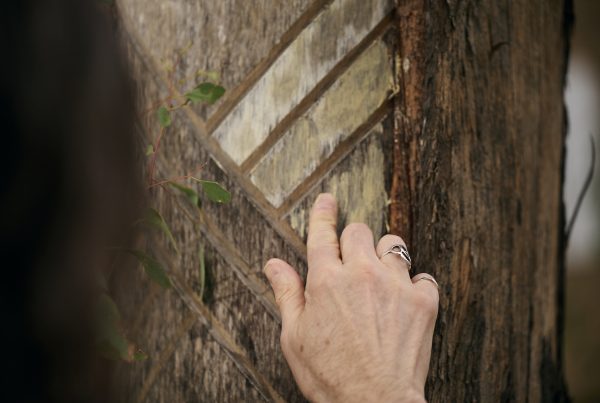Good evening – kapu kut, and good afternoon.
You’re here with us because you’ve been a part of our journey, and you’re very likely to continue to be.
Tonight we celebrate that togetherness, that solidarity, and what can come from envisioning, believing, and standing strong in our ways. I thank and celebrate you. We at the centre thank and celebrate you.
I thank brother Paul Girrawah for his support for the Centre, and for the important protocols you lead and maintain here on this campus. I acknowledge all custodians of Country, and pay respects to your Elders, and all Elders, those whose memories burn bright in our hearts, and those who guide us and refine us and our leadership always.
To the Ngambri and Ngunnawal, your families have welcomed us today, and across generations. We thrive and prosper with your blessing, and acknowledgements often seem inadequate for that, and so too the two words ‘thank you’. Please know that we truly appreciate you, as we live away from home, Country and family. And we seek to honour you, in our work, to show that appreciation.
We are the largest Aboriginal and Torres Strait Islander wellbeing research team in Australia. A team of over close to 60, and the largest employer of Aboriginal and Torres Strait Islander staff at ANU.
We are building better equipped health workforces and data warriors for urgently responding to wellbeing needs. We partner with all Aboriginal and Torres Strait Islander Peak organisations on this work. and generate research and brief their leadership as well as Health Ministers and governments on policy considerations.
For example,
The Mayi Kuwayu Study for example developed the cultural determents framework that sits at the centre of the National Aboriginal and Torres Strait Islander Health Plan, to inform the policy agenda for our health Australia-wide.
The Kulay Kalingka Study, for the first time, asks Aboriginal and Torres Strait Islander peoples about cancer beliefs, attitudes, and experiences, informing 22 of the National Aboriginal and Torres Strait Islander Cancer Control Indicators, where no data currently exists; and to shape the Australian Cancer Plan.
The Centre informs the national health conversation on racism, including developing racism accountability frameworks for health systems in NSW and WA. Our research showed if we eliminate everyday racial discrimination we could close 50% of “the gap” in high psychological distress between us and our counterparts of the wider society.
The Enhanced Chronic Disease Care team (fondly known as ECDC) has informed the national guidelines on CVD risk assessment and reduction for Aboriginal and Torres Strait Islander peoples and is working on a Health funded grant to improve CVD care for our mob.
We were commissioned by the Australian Government to research concerns our mob nationally have about their mental health and wellbeing in relation to the Voice to Parliament Referendum. We co-produced factsheets for the sector to try to reduce the burden currently experienced during these distressing times.
We helped shape the government’s response to the pandemic, by undertaking Rapid Response reviews for COVID 19 in Aboriginal and Torres Strait Islander primary health care settings, in partnership with NACCHO, Lowitja Institute and Royal Australian College of General Practitioners (RACGP).
The Tackling Indigenous Smoking (TIS) Program received a $183.7M 4-year extension (2018) from the Australian Government to support communities nationally to be smoke and vape free, as a result of research led by the Centre’s Tobacco Free program. This work has expanded to produce the most comprehensive review of Indigenous led tobacco control.
The Centre’s Eliminate Cervical Cancer program directly informed the recently released National Cervical Cancer Elimination Strategy. It has also directly contributed to the 2022 policy change that opened access for self-testing to all people with a cervix – significantly increasing the uptake of screening to prevent cervical cancer. We’re now collaborating in a newer project to tackle lung cancer screening.
This is just a small taste. There simply isn’t enough time to do justice to all the areas of impact. The message from us tonight is that we’ll keep building on, and growing to be more to more communities.
What you can expect of us going forward is continuing to put communities first and to be guided by our principle and purpose which is to be in service to Aboriginal and Torres Strait Islander peoples and communities.
Continuing to make an impact and influence systemic change at the policy and community levels to strengthen wellbeing of mob, will continue to ramp up.
The challenge for all of us: Our studies and research projects clearly tell us, now that you know it, you must act upon it.
We must be up for that task. Together. And together with our networks.
We must allow communities to lead, and we must uphold the rights of those we serve. We must do no further harm, and continue to attract, grow and support the most talented, dedicated and passionate researchers, for what we each know, is some of the most important work that anyone could do.
May we always stand strong in what we know and how we know it, also. This includes what we know about what harms and what heals. We remain at the ready to provide expert advice on the stances taken and the positioning of our Centre, College and University and the harm of silence and violence against A&TSI peoples and against Indigenous peoples globally.
Through the work that we do alongside our mob in communities and all of you, we get to deal with what really is, what’s really being experienced, including what powers us, and what strengthens us. Our data and research features the voices of all sections of our communities, and we hear the truth of overcoming, of warriorship, of solidarity, skill, excellence, values, joy, and abundance of love, kinship and community. I know without doubt that Our. Ways. Heal. And we know what harms. As community members ourselves, and even as wellbeing researchers, we are not immune to harms. And so we are thankful to those of you who encourage, in words and in action, us to inform harmfree and healing acts, towards justice, and towards nation building.
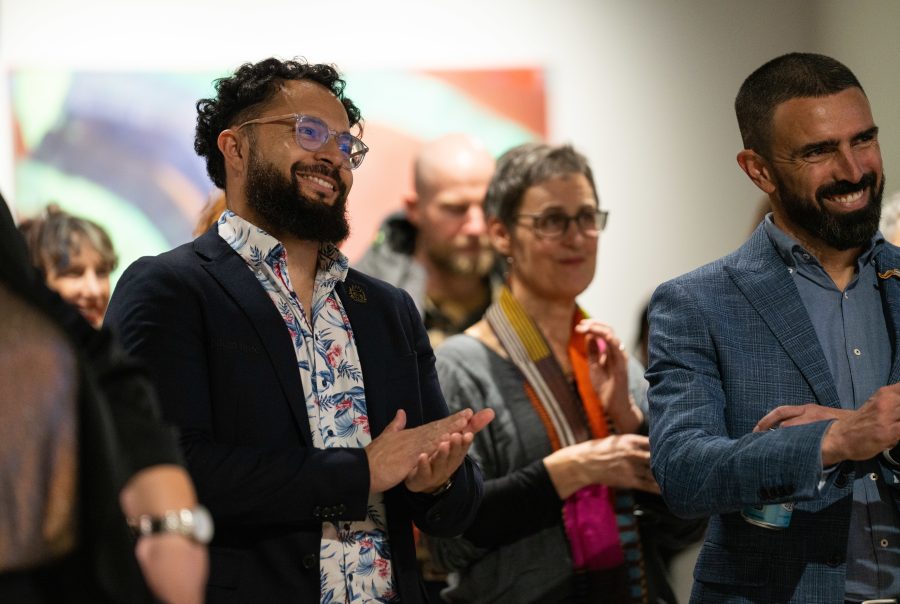
Special mentions:
Thituu Tharmayy – Sissy, Louise, Jasper, Sonia, Carla, Aunty Leone, Uncle Mick, Uncle Tom, Reece, Ali, Your regular time spent with our project teams and reviewing our project work is such a strong pillar of our success.
Aunty Pat Anderson – who was first to respond to the rsvp but was then a late apology – she’s just so very much demand for obvious reasons, and to Uncle Tom Calma – thank you. For your leadership, mentorship, encouragement, and tireless support.
To NCEPH, thanks for helping us build. And supporting a second PhD graduate: Ray and then Tamara. Yes 10 years apart, but we really hope we can celebrate one or two every year one day soon. We’ve got the pipeline established.
Peter Yu, Lachlan Blackhall, DVCRI, Russ Gruen, Hilary Bambrick, Alex and Azure? We are grateful for you standing alongside us.
Collaborating partners of other university teams. This celebration time is for you too.
The core centre team. Or the clutch team, my daughters would say. Claudia, Lachie, Arushi, Makayla and Jules. Your work to pull this night together alongside 33 Creative, speaks to your love of the centre and your colleagues, and boy do we love you back.
To Ray, to Lisa (who I risk wearing my welcome out with, by just naming them), a huge congratulations to each of you for uniting behind the National Centre vision that’s led to this milestone celebrated today. I’ll always be immensely proud and in awe of just what we’re taking on together over the next few years – and I’m just so thankful to be a part of it.
We will continue to pursue justice and exercise our rights. We hold a responsibility. While many research schools accept a lag between research and response, we don’t have that luxury. Our data represents our peoples, individuals, families and communities, and each member of which when lost, cannot be replaced.
The centre’s staff collective embody this great and urgent message.
On their behalf I ask that you all here, stay on the journey with us, as we can guarantee you will not want to miss any of it.
Now to the announcing of our names to be used.
Strong powerful and health energy and place. This is our vision and in Ngunnawal language and our new name launched today is Yadhura Wah-lah-ni.
When we move into our new premises early next year, you’ll have to all visit us again. It will be called Bagaraybang Ngurang, meaning “place of comfort”. It’s a Walgaloo Wuradjuri term, gifted by Paul.
Now to the logo. Shortly you will see a video of artist Teho Ropeyyarn talking about his work. Now a bit of a side note to make this a little personal. Story yarn now.
My great great grandmother Nara Jira Para is sister to Uncle Gordon’s great grandfather Peter Pablo. He and his wife Aunty Agnes are very well-known and respected Elders and teachers in my family.
Uncle Prof Mick Adams attended his tombstone unveiling last year in October as he is also a relation. JP is a nephew, and I am a niece, Aunty Cindy is a cousin-in-law. Dr Ali Drummond here is a nephew also. Ryka who will lead the dancing is a grand-nephew.
I tell you this not to declare conflicts…we are experts at that, but none of this was because of me. It was all in place before I joined the Centre, 9 months ago. I mention it because I can’t help but feel I’m being looked after. And these are all ways to let me know I can feel comfort, and calm and peace as we take on what’s ahead together. I wonder if you too take the moments to see those prompts too.
I told my Mum about the ‘coincidence’ and she said “remember when he visited us in Canberra?”. He told us that we don’t go to Injinoo enough. Mum said “well at least you come this way, Uncle”. And he said, “Once is enough”. Maybe because of the cold. But it was enough, enough to eventually have your teachings represented in a National Wellbeing Research Centre’s logo, Uncle.
My family here, I dedicate tonight to cousin Mark who I fly to in the morning, to lay to rest on Waibene.
Enjoy the video and thanks once again for being here with us.
